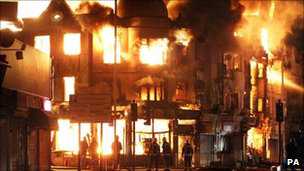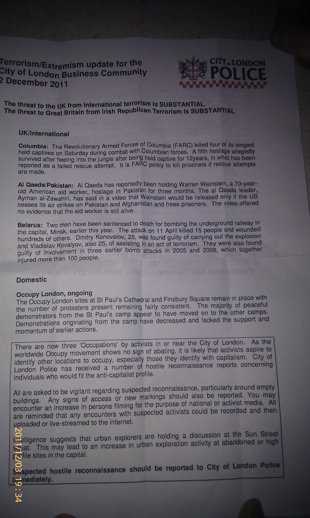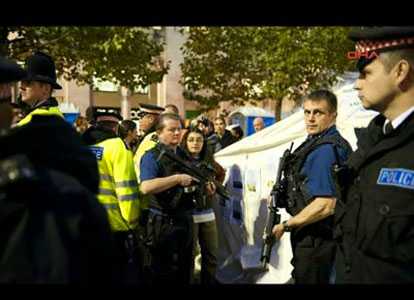 Anti-police sentiment was a significant factor in the summer riots in cities across England, according to a study on causes of the unrest.
Anti-police sentiment was a significant factor in the summer riots in cities across England, according to a study on causes of the unrest.
The study by the London School of Economics and the Guardian newspaper involved interviews with 270 rioters.
Of those interviewed, 85% cited anger at policing practices as a key factor in why the violence happened.
The Association of Chief Police Officers said it was not surprised such a study saw police cited as a factor.
“But August also showed the ability of our police to restore order using robust, common sense policing in the British way,” it said.
Four consecutive nights of looting and arson in August left five people dead and led to more than 4,000 suspects being arrested.
The riots broke out in Tottenham, north London, on 6 August, two days after the fatal shooting by police of 29-year-old Mark Duggan, and subsequently spread to other parts of the capital and other English cities.
Rioters from London, Birmingham, Liverpool, Manchester, Nottingham and Salford were questioned for the LSE-Guardian project.
It is the only study so far into the worst civil unrest for a generation involving in-depth large-scale interviews with people who actually took part in it.
Of the 270 rioters interviewed only about 30 have been arrested as a consequence of their involvement.
The riots were characterised by widespread looting and arson attacks on both businesses and homes.
The BBC’s Newsnight programme has had exclusive access to the results of the LSE-Guardian study.
At the time Prime Minister David Cameron said the unrest had been driven by criminality and devoid of political meaning.
“This was not political protest, or a riot about politics, it was common or garden thieving, robbing and looting,” Mr Cameron told the Commons.
Many of those interviewed admitted they had been involved in stealing, saying that a perceived suspension of normal rules presented them with an opportunity to acquire goods, often describing the riots as a chance to obtain “free stuff”.
However, time and again the interviewees, regardless of where they lived, said they felt like they had been taking part in anti-police riots.
“When we came across a police car it felt like we hit the jackpot,” one rioter said. “We thought we’d just kind of violate just like they violate us.”
Of the 270 people interviewed, 85% said policing was an “important” or “very important” factor in why the riots happened.
It was second only to poverty, which saw 86% of rioters class it as one of the main causes. Eighty percent claimed that government policy was an “important” or “very important” factor, while 79% said the same of unemployment.
The interviewees repeatedly expressed frustrations about their daily interactions with the police, saying that they felt hassled, bullied and complaining that they were not treated as equals.
The focus of much resentment was police use of stop and search which was felt to be unfairly targeted and often undertaken in an aggressive and discourteous manner.
‘Sense of injustice’
Seventy per cent of the rioters said they had been stopped and searched in the last year.
And time and again interviewees described the violence as a chance to get back at the police.
“It was war and for the first time we was in control, like we had the police scared, like there was no more us being scared of the police,” one rioter said.
“We actually had the choice of letting officers off the hook or seriously injuring them.”
Although mainly young and male, those involved in the riots came from a cross-section of local communities.
Half of those interviewed were black, but they did not consider the unrest to be “race riots”.
Rioters identified a range of political grievances, but at the heart of their complaints was a pervasive sense of injustice.
For some this was economic – the lack of money, jobs or opportunity. For others it was more broadly social – how they felt they were treated compared with others.
Many mentioned the increase in student tuition fees and the scrapping of the Education Maintenance Allowance (EMA).
Just under half of those interviewed in the study were students. Of those who were not in education and were of working age, 59% were unemployed.
Jobless numbers
Last week, the government-backed Riots, Communities and Victims Panelpublished its interim report into the causes of the riots and how a repeat of events could be avoided.
Darra Singh, the chairman of the panel – set up by the government – said the findings of the LSE-Guardian study mirrored some of those in its report.
He said: “We identified that rioters’ motivations included the perception that they could loot without consequence, and for some – as the Guardian have also found – a desire to attack the police.”
The panel found that in many areas there was “an overriding sense of despair that people could destroy their own communities”.
It said there was no single cause of the riots, but said it was shocked at the “collective pessimism” among the young people it had spoken to.
Mr Singh said: “The focus for the second phase of the riots panel’s activity is to look more closely at the underlying causes of rioting we identified, including youth unemployment, trust with the police, the role of brands and consumerism, values and parenting.
“As such we look forward to seeing more of the Guardian and LSE’s findings.”
The Metropolitan Police said it was doing everything it could to learn from the summer’s events.
An Association of Chief Police Officers statement said it would be “quite odd” if in a survey of 270 rioters a high proportion did not cite the police as a factor in their behaviour.
It said the disorder was “unprecedented in its scale of violence and the way in which events escalated rapidly”.
It added that not enough police officers had been available initially and it eventually required 16,000 of them to restore order.
“Of course the way in which those events took place and were seen by others through the media had an impact on confidence in the police, and it is important that lessons are learned from all the different processes and reports investigating what happened,” Acpo said.
Labour leader Ed Miliband said there was never any excuse for what happened in August.
He said: “Of course there are issues of policing that need to be looked at, issues of hope and opportunity for young people, those things need to be looked at, but as I say, I don’t think there can ever be an excuse.”
BBC






